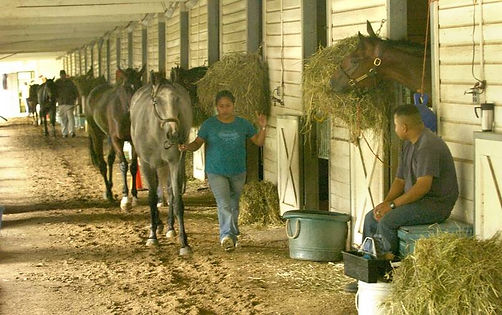Thoroughbred Racing

The Challenge
How can conditions of backstretch workers be improved?
Design direction
Workers need to drive design by being heard, feeling empowered, and being supported
Outcomes
Better housing conditions, improved home-school connections, stronger community
Project Brief

For six years I was a participant-observer in the thoroughbred racing community in Chicago area tracks. My official role was 'maestra' to the migrant backstretch workers. I moved with the workers seasonally from track to track. During one season I lived on the backstretch and worked as a hotwalker in the barns to further immerse myself in the life and culture of the track.
I used qualitative research methods, ethnography, critical pedagogy, and community organizing to surface, document, understand, and address the needs of the migrant workers and families. We created and grew year-round responsive and decolonizing educational and social programming and advocated for improvements regarding housing and working conditions.
This research was written up in my doctoral dissertation, "Kids Off Track: Writing Down the Backstretch".
Programs included:
-
After-school support
-
Homework and tutoring
-
Confronting a colonized curriculum and school system
-
-
English as a Second Language
-
Industry specific vocabulary
-
Critically unpacking labels such as 'wetback', 'illegal', 'undocumented', 'migrant'
-
Giving voice to lived experiences
-
Supporting cultural adjustments
-
-
Teen program
-
Supporting teens in an urban environment
-
-
Mother's club
-
Holding space for women to voice their issues
-
-
Pre-K School Readiness
-
Bridging home and school to prepare children for Kindergarten in the US
-
-
Summer camp
-
Creating an umbrella structure for community partners to operate as a unit
-
Connecting school histories to summer education
-
Field trips to the library, nature center, downtown Chicago
-

The Team

Joaquin Cambray
Program Assistant
Former Backstretch Child and Resident

Veronica Soto
Program Assistant
Backstretch Resident
Parent